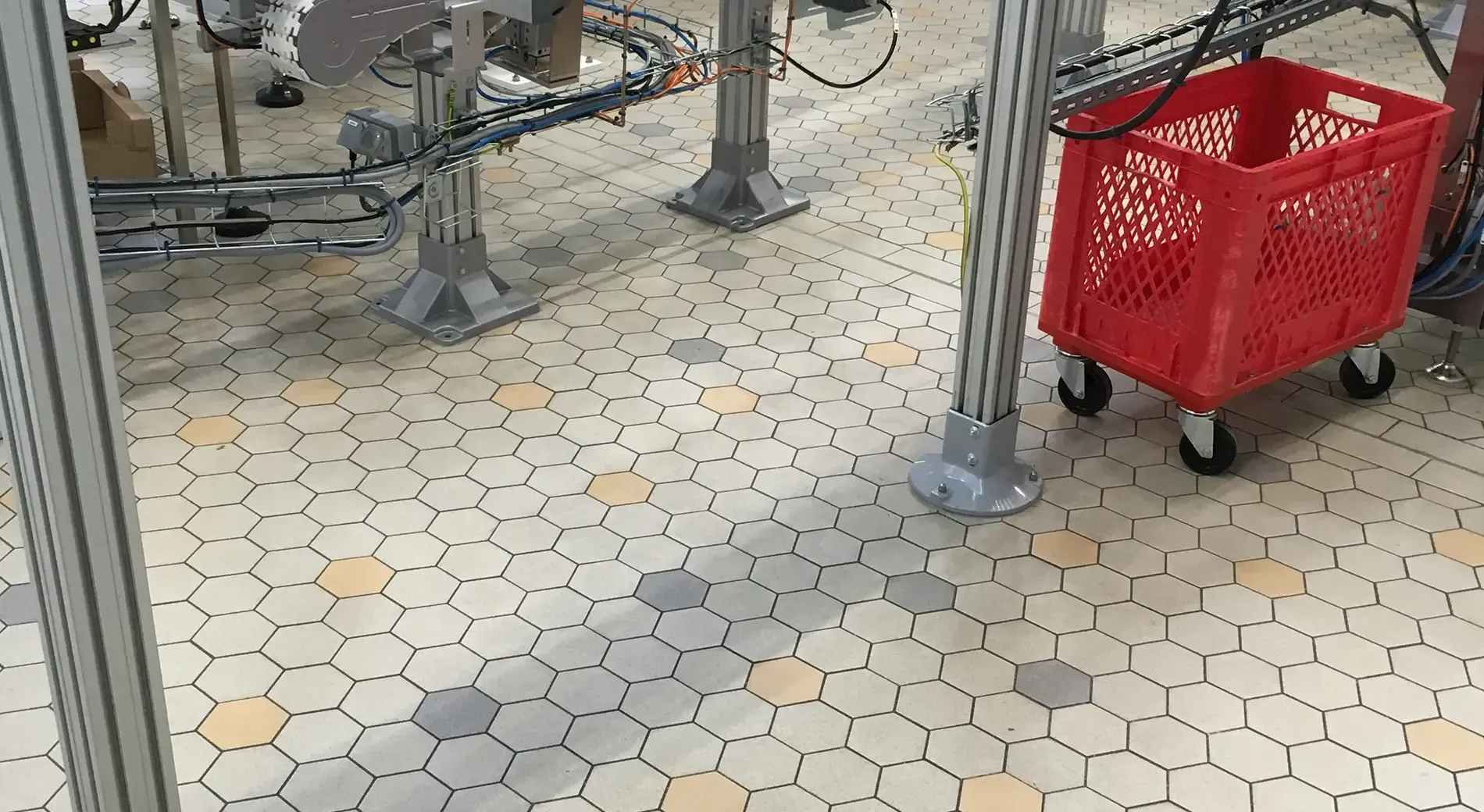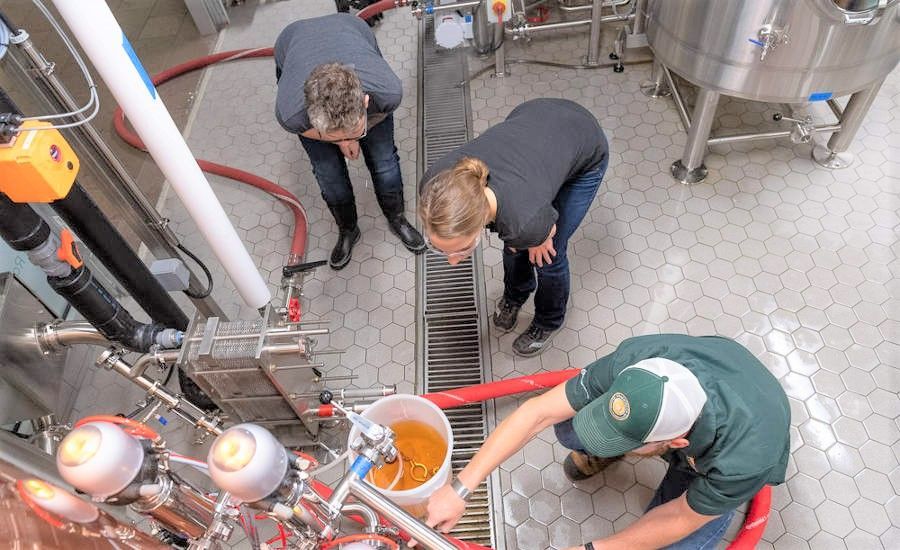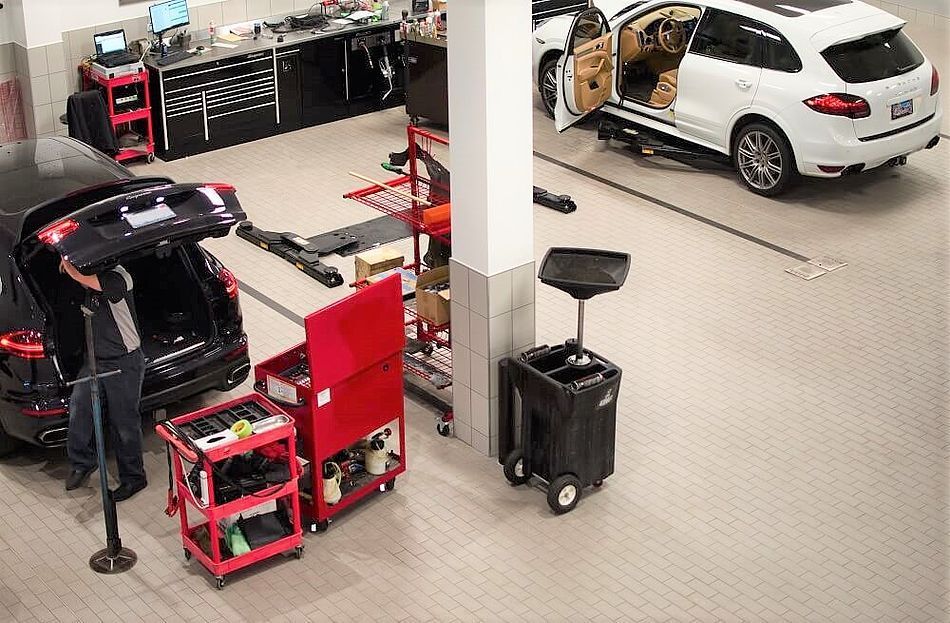Written By: Argelith
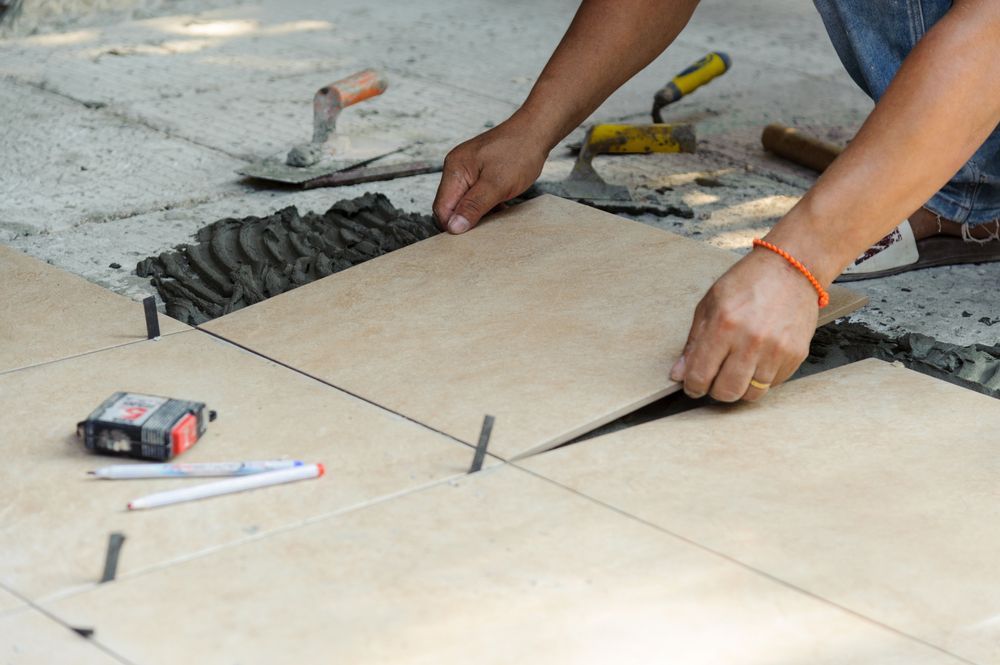
When choosing high-performance flooring for industrial or commercial applications, businesses must balance durability, performance, and aesthetics. Porcelain and vitrified ceramic tiles are both engineered for strength, but they offer distinct benefits tailored to different operational needs. Understanding their differences can help businesses select a flooring solution that withstands heavy traffic, machinery, and rigorous cleaning protocols while maintaining visual appeal. From automotive workshops to food processing facilities, the flooring choice directly impacts safety, longevity, and overall efficiency.
At Argelith Ceramic Tiles, we specialize in engineered tile solutions designed to meet the demands of challenging environments such as automotive workshops, food processing plants, and grocery stores.
What Is Ceramic Tile?
Ceramic tile is a durable and versatile flooring material made from a blend of clay and other natural materials, fired at high temperatures to achieve strength and resilience. Its dense composition makes it suitable for a wide range of applications, including commercial and industrial spaces. Ceramic tiles resist wear, moisture, and moderate impacts, making them a practical choice for environments requiring reliable performance. Depending on the manufacturing process, ceramic tiles can be unglazed or glazed, offering varying levels of slip resistance and aesthetic finishes. Their durability and low maintenance make ceramic tiles a dependable option for businesses seeking cost-effective, long-lasting flooring solutions.
What Is Fully Vitrified Ceramic Tile?
Fully vitrified ceramic tile is an advanced form of ceramic tile engineered for exceptional performance in high-demand environments. During manufacturing, the tiles are fired at extremely high temperatures, causing the clay and minerals to vitrify—transforming into a dense, glass-like structure throughout the tile. This full-body vitrification enhances the tile's strength, making it highly resistant to impact, heavy loads, and wear. Additionally, its low porosity ensures excellent resistance to water absorption, staining, and chemical exposure. The uniform composition of fully vitrified tiles guarantees consistent performance and color even in the event of surface wear, making them ideal for industrial and commercial spaces requiring maximum durability.
What Is Porcelain Tile?
Porcelain tile is a high-performance flooring solution crafted from refined clay and minerals, fired at extremely high temperatures to create an exceptionally dense and durable material. With its ultra-low porosity, porcelain tile resists moisture, stains, and chemical exposure, making it ideal for environments with rigorous cleaning protocols or high humidity. Known for its toughness, porcelain can withstand heavy traffic, machinery, and impacts while retaining its structural integrity and aesthetic appeal. Porcelain tiles are available in through-body or glazed finishes, offering versatile design options with long-term performance. These attributes make porcelain tiles a preferred choice for demanding commercial and industrial applications.
Factors to Consider When Choosing Tiles for Your Business
Selecting the right tiles for a business involves balancing performance and practicality with the unique demands of the space. Key considerations include the tile's ability to withstand wear, moisture, and heat while maintaining an appealing appearance. The specific application—whether a high-traffic retail space or a moisture-prone food processing facility—will influence priorities, from durability and resistance to aesthetic versatility.
Appearance
The appearance of your flooring sets the tone for your business, influencing first impressions and reinforcing brand identity. Tiles offer a wide range of aesthetic options, from clean, minimalistic finishes to bold, vibrant designs. For commercial and industrial spaces, striking the right balance between functionality and style is key. Tiles with through-body color or custom surface treatments maintain their visual appeal even in high-traffic areas. Additionally, consistent finishes and a polished look can enhance the professional image of spaces like automotive showrooms or retail stores. With engineered tile solutions, businesses can achieve a cohesive, attractive aesthetic without compromising on performance.
For businesses requiring extreme durability combined with aesthetic consistency, vitrified ceramic tiles often excel. Both vitrified and porcelain tiles offer excellent moisture resistance, but porcelain may be preferred in spaces where ultra-low porosity and refined finishes are the priority.
Durability
Durability is a critical factor when selecting tiles for high-performance business environments. Both porcelain and vitrified ceramic tiles are engineered to endure heavy traffic, resist impacts, and withstand demanding conditions. Vitrified ceramic tiles offer exceptional strength, with their full-body composition ensuring consistent performance even under extreme wear. Porcelain tiles, known for their dense structure and ultra-low porosity, also deliver outstanding resilience, making them resistant to cracking, chipping, and fading over time. The choice often depends on the specific stressors of your environment—whether it’s the constant weight of machinery or high pedestrian foot traffic, these tiles provide long-lasting, reliable solutions for any application.
Water Resistance
Water resistance is a defining feature of both vitrified ceramic and porcelain tiles, making them excellent choices for environments where moisture is a concern. Porcelain tiles, with their ultra-low porosity, are highly impervious to water, making them ideal for spaces like shopping malls and hotel lobbies where refined aesthetics and moisture resistance are key. Fully vitrified ceramic tiles, with their dense, nonporous structure, are the preferred choice for high-demand environments such as food processing plants, where durability and chemical resistance are essential.
Vitrified ceramic tiles also provide exceptional water resistance due to their dense, vitrified structure, ensuring durability even in wet or humid conditions. Both options resist staining and swelling caused by moisture, maintaining their performance and appearance over time. Choosing the right tile depends on the specific exposure levels and maintenance needs of your business environment.
Heat Resistance
Heat resistance is an important consideration for businesses exposed to high temperatures, such as manufacturing facilities, commercial kitchens, or automotive workshops. Both vitrified ceramic and porcelain tiles are engineered to handle thermal stress without cracking or warping. However, vitrified ceramic tiles are typically thicker than porcelain, allowing them to absorb and release heat more gradually during temperature fluctuations. This added thickness also helps protect against potential delamination caused by extreme heat affecting the thinset adhesive. For environments with sustained high temperatures, vitrified ceramic tiles offer superior stability and long-term performance.
Cost
Cost is a key factor when selecting flooring, and both vitrified ceramic and porcelain tiles offer excellent long-term value. While initial costs for these high-performance materials may be higher than other flooring options, their durability, low maintenance, and longevity help offset these expenses over time. Porcelain tiles tend to be slightly more expensive due to their refined manufacturing process and ultra-low porosity, which deliver premium performance and aesthetics. Vitrified ceramic tiles, though similarly robust, can offer a more budget-friendly alternative while maintaining excellent durability and resistance properties. The choice ultimately depends on your project's budget and the specific demands of your business environment.
Installation
Installation is a critical aspect of selecting flooring, as it impacts both the project timeline and the longevity of the tile solution. Both vitrified ceramic and porcelain tiles require precise installation to maximize performance. Due to their density, these tiles can be heavier and harder to cut, necessitating specialized tools and skilled professionals. Most fully vitrified tiles are dimensionally precise and designed for butt-jointed installation, requiring very narrow grout joints (approximately 1/16"–1/8"). This demands expertise to ensure the grout joints are fully and properly filled.
In automotive workshops and grocery stores, any experienced commercial tile installer can effectively install Argelith tiles. However, for food and beverage facilities using our Hexalith tiles, we recommend a qualified installer. These tiles require specialized handling, particularly due to the need for epoxy grout, which adds complexity to the installation process. If your project requires specialized expertise, Argelith can connect you with experienced installers familiar with our products to ensure a seamless and high-quality installation.
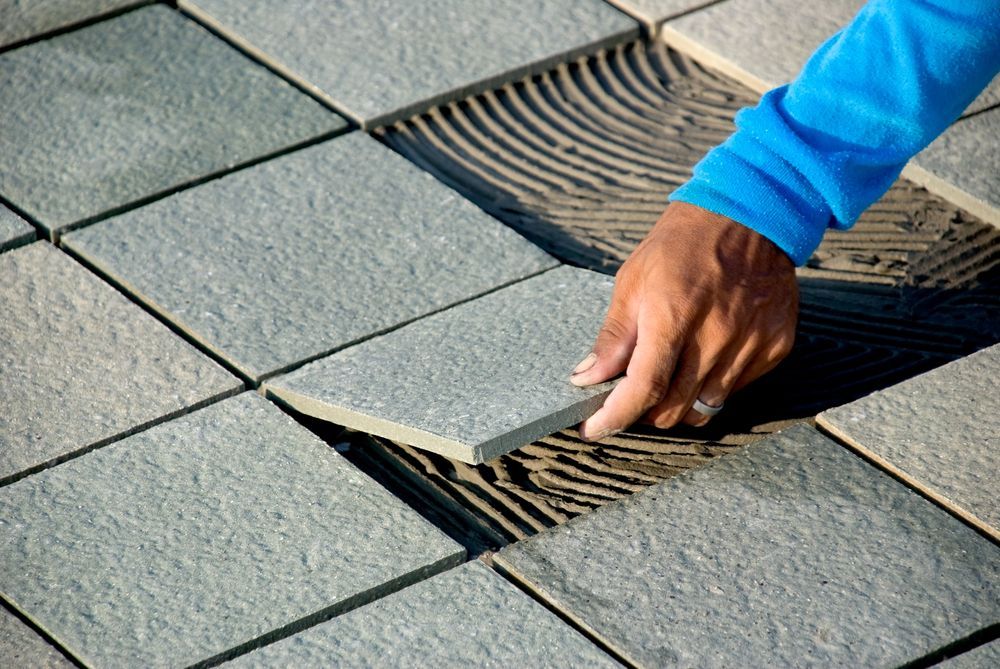
Material Description and History
- Porcelain: Traditionally regarded as a premium material in ceramic manufacturing, porcelain is valued for both its strength and aesthetic versatility. Its dense composition makes it resistant to scratching and cracking, making it a suitable choice for many high-traffic areas. However, thinner porcelain tiles are more prone to cracking under heavy loads, which is why thickness is a key factor when selecting tiles for industrial environments.
- Fully Vitrified Ceramic Tile: A modern innovation, fully vitrified tiles combine technical performance with aesthetic appeal. These tiles are made by mixing finely ground clay with other materials and firing them at high temperatures, resulting in an extremely robust, impermeable product suitable for flooring—even outdoors.
Technical Properties and Advantages
- Porcelain Tiles: Despite their hardness, porcelain tiles can be more delicate under impact and are often better suited for walls or lower-traffic areas.
- Fully Vitrified Tiles: With superior robustness and resistance to impacts, chemicals, and heat, fully vitrified tiles are the top choice for high-traffic areas and industrial applications. Their ability to maintain appearance and performance over time makes them a durable, cost-effective solution.
Applications
Both vitrified ceramic and porcelain tiles excel in demanding business applications, but fully vitrified ceramic tiles often provide an edge in industrial and high-traffic environments. Their dense, full-body structure ensures superior strength, making them an excellent choice for factories, automotive workshops, and grocery stores where heavy machinery and constant movement are commonplace. Vitrified ceramic tiles also offer consistent performance in environments requiring chemical resistance, such as food processing plants and laboratories. Their durability ensures they maintain their aesthetic and functional integrity even under extreme stress.
Porcelain tiles, with their ultra-low porosity and refined finish, are ideal for spaces where water resistance and sophisticated design are prioritized. They are frequently used in commercial kitchens, hotels, and public restrooms where hygiene and ease of cleaning are essential. The sleek appearance of porcelain also makes it popular in retail spaces and showrooms where aesthetics play a significant role in the overall customer experience.
While both materials are versatile and resilient, vitrified ceramic tiles shine in applications where heavy-duty performance and cost-efficiency are paramount. Their ability to handle high-impact environments without compromising durability or appearance makes them a preferred solution for many industries. Porcelain, on the other hand, offers the perfect blend of performance and design for spaces requiring an elevated look alongside robust functionality. Both options deliver exceptional value tailored to specific business needs.
Maintenance
Vitrified ceramic tiles and porcelain tiles are both low-maintenance, but vitrified tiles often provide added advantages in demanding environments. Their dense, full-body construction resists stains, moisture, and wear, making them ideal for areas with heavy foot traffic, machinery, or chemical exposure. To maintain their performance and appearance, proper cleaning methods should be used based on the environment.
While porcelain tiles also offer low porosity and stain resistance, vitrified ceramic tiles shine in durability and resilience, maintaining their performance and appearance over time. For businesses prioritizing cost-effective, long-term upkeep, vitrified ceramic tiles are a superior choice.
Our Recommendation
For businesses seeking a high-performance flooring solution, fully vitrified ceramic tiles are the ideal choice for most industrial and commercial applications. Their unmatched durability, full-body strength, and resistance to moisture, chemicals, and heavy impact make them a standout option for factories, automotive workshops, and food processing facilities. Vitrified tiles combine cost-effectiveness with exceptional performance, ensuring long-term value and reliability.
Build for the Toughest Environments-Explore Our Ceramic Tile Solutions
At Argelith Ceramic Tiles, we understand the demands of industrial and commercial spaces. That’s why our ceramic tiles are engineered to excel in the toughest conditions, offering unparalleled durability, slip resistance, and low maintenance. From fully vitrified ceramic tiles built to handle heavy machinery and chemical exposure to versatile options designed for high-traffic areas, our solutions are tailored to meet the needs of your industry. Whether outfitting an automotive workshop, food processing facility, or grocery store, Argelith tiles deliver performance you can trust. Explore our engineered tile solutions, or schedule a consultation to begin that conversation and see exactly how we can elevate your business with flooring designed to last.
Argelith Ceramic Tiles, Inc.
40W310 LaFox Road, Suite F2
St. Charles, IL 60175
> © 2024 Argelith. Website imagined & executed by RivalMind.

